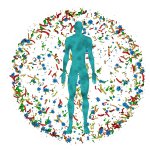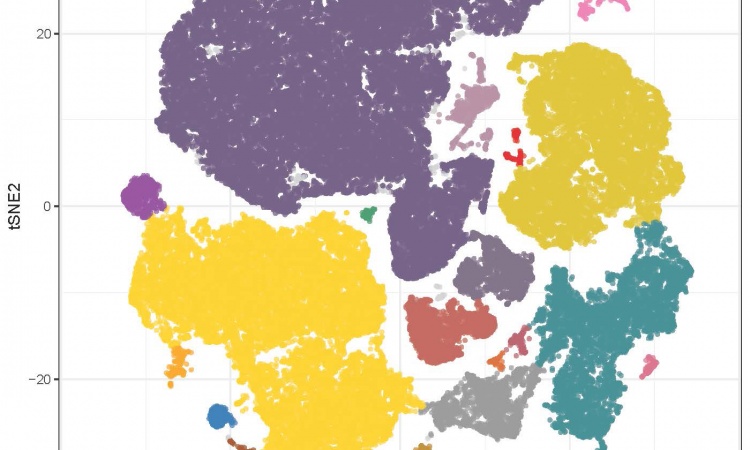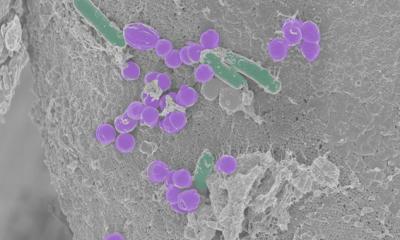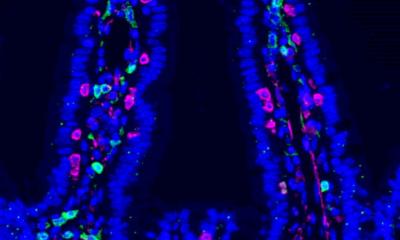Image source: Shutterstock/Anatomy Insider
News • Intestinal bacteria reprogram DNA activity
The uncanny influence of our gut flora
Scientists from the German Cancer Research Center (DKFZ) and the Hebrew University in Jerusalem demonstrated in mice that intestinal bacteria reprogram DNA activity in cells of the gut mucosa and thus have a considerable impact on the development of the healthy gut.
Acute intestinal inflammation induced under experimental conditions led to a huge increase in the activity of inflammation-related and cancer-promoting genes in the mucous membrane cells of microbe-colonized animals.
The researchers published their findings in the journal Nature Microbiology.
A large body of research work indicates that the intestinal microbiota – in other words, all the microorganisms that colonize the human gut – and its composition are linked to a whole series of diseases. The illnesses range from inflammatory diseases of the intestine and metabolic disorders such as obesity and diabetes to cancer, autism, and depression.
Recommended article

Article • Interdisciplinary
Exploring the human microbiome
During the International Forum for Laboratory Medicine, one seminar focused on infectious diseases. Professor André Gessner, from the Medical Microbiology and Hygiene Department at Regensburg University, lectured on ‘The human microbiome, an explosive ‘climate’ topic,’ he explained.
These studies usually only show links and do not clarify the mechanisms by which the intestinal microbes affect the human body. Frank Lyko from the DKFZ and Yehudit Bergman from the Hebrew University in Jerusalem teamed up to address this issue. To do so, the researchers compared the DNA of the gut mucosal cells in mice with a normal microbiome with those of mice who had grown up in sterile conditions. They focused on analyzing DNA methylation, known as epigenetic marking, which prevents DNA-binding proteins from attaching to the DNA at these sites, hence restricting the activity of the genes there.
The researchers noticed considerable differences in the methylation patterns between sterile and microbe-colonized animals. In the latter, they found a group of "sentinel genes" activated by demethylation, which are responsible for the normal regeneration of the intestinal mucosa in the healthy gut. Both the microbe-colonized mice and the sterile animals were treated using a chemical that attacks the intestinal mucosa, thus inducing acute inflammation. In the microbe-colonized animals, this treatment led to a reduction in DNA methylation in the gut mucosal cells, particularly affecting a number of regulatory elements. As a result, many genes that play a role in inflammation and in cancer were activated.
This once again underlines the key role that microbes play in epigenetic regulation
Frank Lyko
In contrast, the chemical hardly caused any changes in genetic activity in the microbe-free mice. "That shows that the differences in methylation are due to the bacteria and not to the chemical," Frank Lyko explained. However, if the microbiome of the microbe-colonized mice was transferred to the microbe-free animals, methylation of the intestinal mucosal cells was reduced in these mice too.
The team of German and Israeli researchers realized that this effect apparently depends on the demethylating enzymes TET2 and TET3: If they were turned off genetically, treatment with the chemical hardly caused any changes in the genome methylation. "The microbiome seems to have a considerable influence on the animals' health: It ensures normal intestinal development by using epigenetic programming to activate genes that steer regeneration of the gut mucosa. In the microbe-free mice, however, this activation does not take place," Frank Lyko explained. "During acute inflammation, the gut microbes also cause a change in genetic activity, and genes are dysregulated that are also dysregulated in patients with intestinal inflammation and cancer of the colon. This once again underlines the key role that microbes play in epigenetic regulation," he added.
Source: German Cancer Research Center (DKFZ)
05.03.2020





